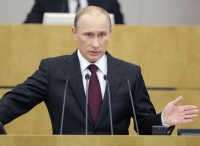Putin: Russia to become one of world's largest economies
 On April 20, Prime Minister Vladimir Putin presented a report about the activity of the government of the Russian Federation in 2010 to the State Duma. Putin also answered questions from members of the Russian parliament.
On April 20, Prime Minister Vladimir Putin presented a report about the activity of the government of the Russian Federation in 2010 to the State Duma. Putin also answered questions from members of the Russian parliament.
In accordance with the Constitution of the Russian Federation, the government must account for its activity to the State Duma every year. For Putin, it was his third report speech to the lower house of the Russian parliament. The basic part of his speech lasted for 2 hours and 20 minutes.
Like in the previous reports, Putin paid attention to the issues connected with the consequences of the world crisis. The consequences of the crisis increased the social tension and destabilized the situation in many countries and even whole regions of the world, Putin said.
"The lesson that we all have to learn is the following. The economic and government infirmity, as well as instability to external shocks inevitably turn into a threat to national sovereignty," he said. Russia managed to avoid serious shocks and risks during that complicated period.
"It is especially important that in the course of the struggle with the crisis we did not refer to insurmountable objective circumstances, although there were more than enough of risks and factors of uncertainty. We did not shrink responsibilities for the state of affairs in the country, but claimed responsibility instead," Putin stressed out.
Putin did not have to blush when talking about the things, which the government had to do during a very complicated period for Russia.
"The country has been through tremendous economic difficulties. Nevertheless, the country managed to provide over 250,000 apartments to military men and Great Patriotic War veterans [...] In 2010, pensions were raised by 45 percent. The construction of 38 new perinatal and high-tech medical centers was organized. We continued to execute large-scale demographic programs; the spending on education increased 1.5 times, assignments from the federal budget on civil science increased twice. The economic growth resumed in the country beginning from July of 2009. The GDP of Russia grew by four percent in 2010 - this is the highest index among all other members of the Group of Eight," Putin said.
The forecast for the current year is 4.2 percent. "It means that by the beginning of 2012, the Russian economy will fully compensate the losses caused by the crisis," Putin added.
According to the prime minister, Russia is expected to become one of world's five largest economies on the volume of the GDP. As for the GDP per capita, the country is expected to hit the level of $35,000 per person, which is higher than the current indices of such countries ans France and Italy, Putin said. Russia falls behind the leading countries, but during the upcoming decade the productivity of labor in Russia is expected to at least double, Putin stressed out. In the key branches of the Russian economy, the productivity is expected to triple and quadruple. The share of innovative production in the total volume of production is expected to increase from the current 12 to 25-35 percent.
"The country needs decades of stable and calm development, without any jitters, hasteful experiments based on unjustifiable liberalism or social demagogy. And of course we must maintain civil and international peace, and prevent any attempts to split our society," Putin said.
In the speech, Putin touched upon piratically all questions connected with the development of economy, agriculture, army and defense industry, medicine, education and social security.
"I'd like to say that the government will take all measures to keep the stable economic development and to guarantee the growth of the well-being of Russian families. We were inevitably following the main principle - to listen to people, to work for people, and we are not going to step back from this principle. People's support always helps; it inspires us for making complicated and most responsible decisions. We will do our best to justify people's confidence," Putin said at the end of his speech.
After the speech, Putin answered questions from representatives of parliamentary factions. A member of the Communist Party asked Putin a question about the problem of suburban railway service. LDPR was interested in the situation with the growth of tariffs on electricity, heat and water supplies. A member of United Russia asked the prime minister about the strategy of the future development of healthcare.
"The dialogue about the government and the parliament is extremely important. This is a very positive and detailed dialogue. We can hear each other and we agree on basic concepts of the development of the country. This is very important, the Russian prime minister concluded.
Lev Pravin
Pravda.Ru
Subscribe to Pravda.Ru Telegram channel, Facebook, RSS!




